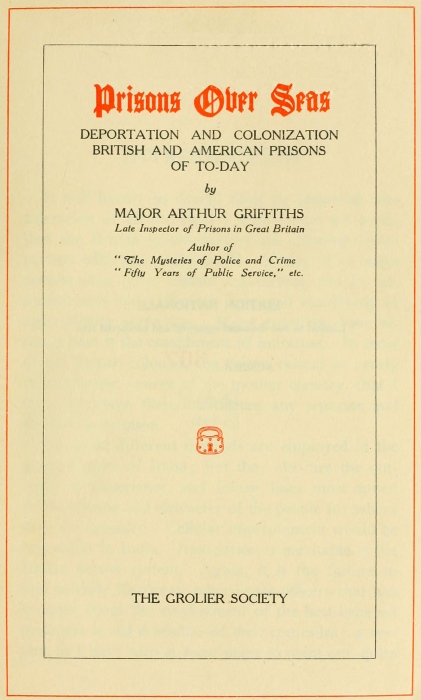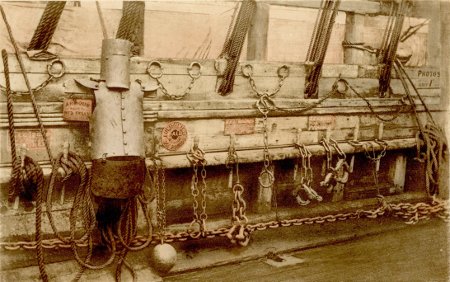The History and
Romance of
Crime
FROM THE EARLIEST TIMES
TO THE PRESENT DAY

THE GROLIER SOCIETY
LONDON
Armour of Ned Kelly and Manacles Worn by Prisoners in Tasmania
The Kelly gang of bushrangers, of which Ned Kelly was chief, woreveritable armour, bullet-proof, made of old plough shares, iron pots andscrap iron. They terrorised the northeastern part of New South Walesfrom 1870 to 1878, and it became known as the "Kelly country."Troublesome bushrangers also devastated Tasmania, and when captured,were hanged or sent to the penal settlement at Norfolk Island.

Prisons Over Seas
DEPORTATION AND COLONIZATION
BRITISH AND AMERICAN PRISONS
OF TO-DAY
by
MAJOR ARTHUR GRIFFITHS
Late Inspector of Prisons in Great Britain
Author of
"The Mysteries of Police and Crime"
"Fifty Years of Public Service," etc.

THE GROLIER SOCIETY
EDITION NATIONALE
Limited to one thousand registered and numbered sets.
NUMBER 307.
INTRODUCTION
It will hardly be denied after an impartial consideration of all thefacts I shall herein set forth, that the British prison system canchallenge comparison with any in the world. It may be no more perfectthan other human institutions, but its administrators have laboured longand steadfastly to approximate perfection. Many countries have alreadypaid it the compliment of imitation. In most of the British colonies,the prison system so nearly resembles the system of the mother country,that I have not given their institutions any separate and distinctdescription.
No doubt different methods are employed in the great Empire of India;but they also are the outcome of experience, and follow lines mostsuited to the climate and character of the people for whom they areintended. Cellular imprisonment would be impossible in India.Association is inevitable in the Indian prison system. Again, it is thefailure to find suitable European subordinate officers that has broughtabout the employment of the best-behaved prisoners in the discipline oftheir comrades: a system, as I have been at some pains to point out,[Pg 6]quite abhorrent to modern ideas of prison management. As for theretention of transportation by the Indian government, when so clearlycondemned at home, it is defensible on the grounds that the penalty ofcrossing the sea, the "Black Water," poss

